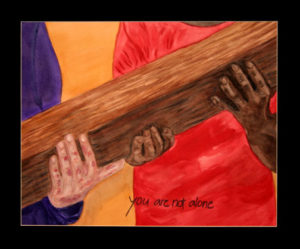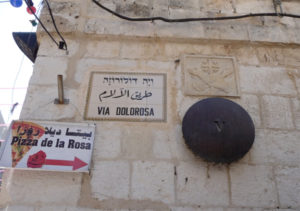The Eighth Station: Simon of Cyrene Helps Jesus to Carry the Cross
As they led him away, they seized a man, Simon of Cyrene, who was coming from the country, and they laid the cross on him, and made him carry it behind Jesus.
Luke 23:26

Painting © Linda E.S. Roberts, 2007. For permission to use this picture, contact Mark D. Roberts.
Christians from all over the world come to Jerusalem to walk along the Via Dolorosa, the way of suffering, the way of the cross. This path through the streets and alleys of Jerusalem is believed to be the path Jesus actually walked on the way to his crucifixion. It is marked by the fourteen traditional Stations of the Cross. Each of these stations commemorates an event in the last hours of the life of Jesus. Many of the traditional stations are based on the biblical text, though some come from ancient Christian tradition. In this Life for Leaders devotional series, we are using a new version of the stations, something John Paul II published in 1991. In this version, all of the stations are based on passages from the biblical gospels.
The eighth station of the biblical stations is called “Simon of Cyrene helps Jesus to Carry the Cross.” It is identical to the fifth station in the traditional numbering system. Both are based on Luke 23:26, in which an otherwise unknown man named Simon, from the city of Cyrene (in modern Libya), is pressed into service. He helps Jesus carry his cross to Golgotha, where Jesus will be crucified.
As I walked along the Via Dolorosa several years ago, I found a peculiar sight when I arrived at the fifth station. Yes, one sign said in Latin, SIMONI CYRENAIO CURX IMPONITUR, meaning, “The cross is imposed on Simon of Cyrene.” But, across the narrow street, another sign identified this location as the fifth traditional station, with a large Roman number V. A nearby sign proclaimed that this was part of the Via Dolorosa. And then another sign pointed to “Pizza de la Rosa.”

Photo used by permission from Mark D. Roberts. All rights reserved.
I would confess that when I first saw the “Pizza de la Rosa” sign I was bugged, almost offended. Playing on the sound of “Via Dolorosa” just didn’t seem right. It felt as if a hostile world was invading this sacred space. In fact, though, the Via Dolorosa does not go through some quiet garden in Jerusalem, a place for uninterrupted meditation. It is mainly in the Muslim quarter of the city, which is filled with crowded little streets, souvenir shops, and places to buy omnipresent Coca-Cola. One of the holiest places for Christian pilgrims is, in fact, somewhere you can purchase lots of t-shirts with both pro- and anti-Israel slogans, not to mention Boston Red Sox shirts with Hebrew lettering.
At first, I was disappointed by the reality of the Via Dolorosa. But, as I reflected on what I saw, it struck me that all of this was strangely appropriate. Remember, Jesus did not come into some antiseptic world. He was not born as a prince, safely separated from the nitty-gritty realities of society. Rather, he came into the real world, the world of commerce and conflict. As Jesus and Simon carried the cross through Jerusalem, nobody played Celtic harp music in the background. Rather, the din of a crowded city filled the air. There might not have been t-shirt shops back then, but there were plenty of vendors selling and customers buying, people who might have paused for a moment to watch two poor souls carry a cross to Golgotha before they got back to their business.
So, upon reflection, I no longer resent the “Pizza de la Rosa” sign. Oh, I don’t think it’s in especially good taste (the sign, that is, not the pizza, which I did not sample). But that sign reminds me that Jesus came into the real, messy, confused, dusty, loud, conflicted world. The Word Incarnate didn’t hide away in some Eden-like garden. Rather, he came into the world of hunger, disease, ethnic conflict, political domination, religious hypocrisy, and lost humanity. Into this world, our world, Jesus brought a vision of God’s reign. He offered healing to the sick, food to the hungry, meaning to the despairing, and hope for all.
QUESTIONS TO CONSIDER:
How do you envision Jerusalem on the day in which Jesus carried his cross to Golgotha?
What helps you to remember that Jesus came into the real world, not some tidy, religious world in which everything is safe and easy?
Do you ever think of Jesus being present with you in your daily work? If so, what difference does it make? If not, why not?
PRAYER:
Gracious Lord Jesus, thank you for coming into the real world. Thank you for knowing what it’s like to be human. Thank you for walking along crowded streets and shopping in busy marketplaces. Thank you for making your home with us, for real.
Lord, help me to be aware of your presence in my life, not just when I’m in times of prayer or worship, but also when I’m walking along a crowded street or trying to get my work done so I can go home. May I know that you are with me always, just as you promised. And may I serve you in every part of life.
All praise be to you, Lord Jesus, Word of God Incarnate. Amen.
Explore more at the Theology of Work Project online commentary: In the Beginning was the Word (John 1:1-18)

Mark D. Roberts
Senior Fellow
Dr. Mark D. Roberts is a Senior Fellow for Fuller’s Max De Pree Center for Leadership, where he focuses on the spiritual development and thriving of leaders. He is the principal writer of the daily devotional, Life for Leaders, and t...


